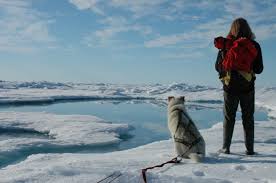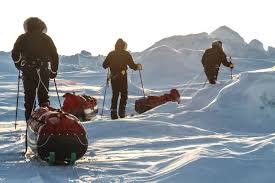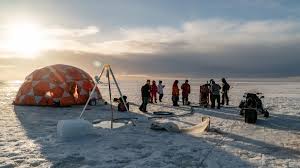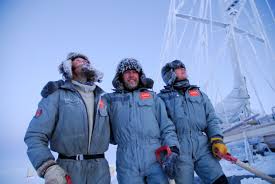The Arctic Exploration, a remote and largely uninhabited region, has captured the imagination of explorers, scientists, and adventurers for centuries. Its icy expanse holds mysteries about our planet’s climate, ecosystem, and untapped resources. Arctic exploration has not only contributed to our understanding of Earth’s past and present but also shapes the future of global policies on climate change, resource management, and geopolitics.
The Arctic’s significance lies in its unique environment, where extreme cold and ice create conditions that challenge even the most advanced technologies. Explorers have ventured here for scientific research, trade route discoveries, and national prestige. This ongoing pursuit of Arctic knowledge continues to have a profound impact on environmental science and international relations.
Historical Perspectives on Arctic Exploration

Historically, Arctic exploration was driven by curiosity and ambition. Early explorers, such as the Vikings and Inuit populations, navigated the Arctic’s challenging conditions long before European expeditions began. These indigenous communities developed survival techniques and deep knowledge of the Arctic landscape, which later became invaluable to Western explorers.
The Age of Exploration brought a wave of Arctic expeditions from Europe, particularly during the 16th to 19th centuries. Explorers like Sir John Franklin, Roald Amundsen, and Fridtjof Nansen risked their lives to map uncharted territories. Many expeditions ended tragically, highlighting the region’s dangers. Despite these challenges, their efforts paved the way for modern Arctic studies, including mapping, oceanographic research, and climatology.
Modern Challenges in Arctic Exploration
In the 21st century, Arctic exploration faces new challenges as the region undergoes dramatic changes due to global warming. The melting of Arctic ice is opening previously inaccessible areas, prompting a surge in interest from countries, scientists, and corporations. This phenomenon has introduced opportunities and risks, including the exploitation of natural resources, the opening of new shipping routes, and increased environmental vulnerabilities.
Modern Arctic explorers must contend with ethical and ecological dilemmas. For instance, the extraction of oil and gas in the Arctic could have devastating effects on its fragile ecosystem. Additionally, the thawing permafrost releases methane, a potent greenhouse gas, exacerbating global warming. Balancing scientific exploration with environmental preservation remains a critical concern.
Scientific Discoveries in the Arctic
The Arctic serves as a natural laboratory for scientists studying climate change, marine biology, and geology. Research conducted in this region provides valuable insights into Earth’s climatic history and the future trajectory of global warming. For example, ice cores extracted from glaciers contain trapped air bubbles that reveal atmospheric composition over thousands of years.
Marine scientists have also uncovered a wealth of biodiversity in the Arctic Ocean. Species like the narwhal, Arctic cod, and polar bear are critical to the region’s ecosystem. Studying these species helps researchers understand the impacts of climate change on marine life and develop conservation strategies.
Furthermore, the Arctic’s geology offers clues about the planet’s tectonic activity and the formation of natural resources. The region is rich in minerals, including rare earth elements, which are essential for modern technologies. However, extracting these resources presents ethical and environmental challenges that must be addressed responsibly.
The Role of Indigenous Knowledge

Indigenous communities, including the Inuit, Sámi, and Chukchi, have lived in the Arctic for centuries, developing deep connections with the land and sea. Their traditional knowledge is an invaluable resource for Arctic exploration and research. Indigenous practices, such as sustainable hunting and navigation techniques, provide insights that complement modern scientific methods.
Efforts to include indigenous voices in Arctic exploration have grown in recent years. Collaborative research initiatives between scientists and indigenous communities aim to integrate traditional knowledge into environmental studies and policy-making. This approach not only enriches our understanding of the Arctic but also ensures that exploration is conducted with respect for its original inhabitants.
Geopolitical Implications of Arctic Exploration
As Arctic ice recedes, geopolitical tensions are rising. Countries bordering the Arctic, such as Russia, Canada, and Norway, are asserting their claims over territories and resources. The Arctic Council, an intergovernmental forum, plays a crucial role in fostering cooperation among Arctic nations. However, differing national interests sometimes hinder consensus on critical issues.
The opening of Arctic shipping routes, such as the Northern Sea Route, has heightened international interest in the region. These routes offer shorter travel distances between major markets but raise concerns about environmental damage and sovereignty disputes. The competition for control over Arctic waters underscores the need for clear and enforceable regulations.
Technological Innovations in Arctic Exploration

Advancements in technology have revolutionized Arctic exploration. Autonomous underwater vehicles (AUVs), drones, and satellite imaging enable researchers to collect data in extreme conditions. These tools have pulitoto made it possible to monitor changes in Arctic ice, map the ocean floor, and track wildlife migration patterns.
Icebreaker ships, designed to navigate through thick ice, are essential for modern expeditions. These vessels support scientific research and ensure the safety of explorers in remote areas. Additionally, remote sensing technologies, such as radar and LiDAR, provide accurate and detailed information about Arctic topography and weather conditions.
The Future of Arctic Exploration
The future of Arctic exploration depends on global cooperation and sustainable practices. Addressing the challenges of climate change requires a concerted effort from governments, scientists, and local communities. International agreements, such as the Paris Agreement, play a vital role in mitigating the impacts of global warming on the Arctic.
Exploration efforts must prioritize environmental protection and respect for indigenous cultures. Collaborative projects that involve multiple stakeholders can help balance the pursuit of knowledge with the preservation of Arctic ecosystems. Additionally, promoting renewable energy sources and reducing reliance on fossil fuels are essential steps toward safeguarding the Arctic’s future.
Conclusion
Arctic exploration is a journey into one of Earth’s most challenging and enigmatic regions. It has provided humanity with invaluable knowledge about our planet’s history, climate, and resources. However, the Arctic’s fragile environment and geopolitical complexities demand a responsible and collaborative approach to exploration.
As we continue to unlock the secrets of the Arctic, it is imperative to prioritize sustainability and inclusivity. By integrating scientific research, technological innovation, and indigenous wisdom, we can ensure that Arctic exploration benefits both current and future generations while preserving the integrity of this last frontier.
